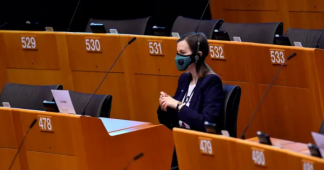Timeo neoliberales et dona ferentes
I would like to draw attention to an unusual proposal for overcoming the economical consequences of the corona crisis which was made or supported by at least the governments of France, Spain and Italy. I am surprised that it received so little attention by the left, and by the media in general.
Eternal bonds
It concerns the proposal to use ‘eternal bonds’ as a means for financing a European recovery plan. As is well known, bonds are the instrument by which states contract loans on the financial markets in order to finance their debt. A 10-year bond of 10 billion euro at an interest rate of 2% e.g. means that the state pays yearly 200 million interest, and has to pay back the loan after 10 years, which usually means that the state contracts a new loan in order to do so. However, the period of 10 years can in principle be extended to 20, 50, 100 years, meaning that for a long time only interest has to be paid. There is no reason why ‘eternal bonds’ could not be considered, meaning they are never paid back, but the issuer has to pay interest till the end of days. Eternal bonds are sometimes called ‘consols’ for historical reasons. Debts contracted for war purposes have often been of the very long type.
In the framework of the corona crisis, consols have been proposed by the Spanish prime minister Sánchez (he spoke of 1500 billion euro, see Reuters, April 20, Spain seeks 1.5 trillion euro recovery fund using EU perpetual debt) and the Italian government said to be interested in the proposoal. Moreover, similar ideas were advanced within the liberal fraction (Renew Europe) of the European Parliament (see Guy Verhofstadt, Toward a European Reconstruction Fund and Dragoș Pîslaru, Reforms, investment and the EU Recovery Plan).
In contrast with ‘corona bonds’, consols would not add to sovereign debt. If the consols are issued by the European Commission, they could be distributed as grants. The annual interest to be paid, would depend on a number of factors. If the bonds are offered on the financial markets, investors will expect a considerable return; Verhofstadt speaks of a rate of 2,5%, although billionaire George Soros – who is in favour of consols for financing the European recovery fund, see The EU should issue perpetual bonds to fund the economic recovery from coronavirus – mentions 0,50%. For a fund of 1 trillion, this amounts to the rather modest interest of 5 billion, which shrinks in relative terms by the years due to inflation. But there is the other ‘utopian’ possibility of a zero (or very low) rate, which would not attract financial markets, but the European Central Bank could immediately buy the bonds and ‘monetize the debt’. Of course, this would be ‘against the treaties’, but shrewd jurists could probably find something on it if political leaders would opt for such a way out of a 1929 like crisis.
But where is the catch?
Some will warn for a terrible inflation which would follow, the more so if the money would be newly created by the ECB (instead of attracting existing money held by the financial markets). Not being an economist (and even if I were …) I have no estimate of the risk for an uncontrollable inflation. But I know that inflation in the EU still not reaches 2% after the 2,5 trillions of injected QE money by the ECB. Moreover, if the money is spent on new (green, social …) projects, this would not directly influence consumer prices, as consumers will not buy more windmills. And would it be that terrible if inflation increased due to full employment and increased wages? Isn’t inflation the euthanasia of the rentier? And very importantly, consols should possibly be considered as an exceptional solution to an exceptional problem, but there are other permanent measures which the Left should defend and which diminish the mass of excess money: a tax on wealth, on benefits, on upper incomes, on capital and capital gains…
Neoliberal sugar uncles?
But the intriguing question is: why the heaven would neoliberals as Verhofstadt and Macron defend grants to member states?
A first answer could be that some liberal politicians are more aware than others of the extremely serious situation in which COVID-19 has brought the European capitalist order, and their favoured European ‘project’ in particular. This is also true for Merkel. Not surprisingly, the proposal for a Recovery Fund she made with Macron on May 18 [1] is not based on eternal bonds, but is generally considered as ‘revolutionary’ in that it breaks with European usage and proposes to distribute hundreds of billions of euros as grants, not as loans. The problem of Merkel-Macron will be to convince their not less neoliberally minded but less strategically thinking Dutch, Austrian and Scandinavian colleages of the necessity of such move.
For Macron, it is also a means to show some independence vis-à-vis Germany, and strengthen ties with countries as Spain and Italy with which France is in better economical ‘resonance’ than with Germany.
But the most important consideration is that neither the consols of Verhofstadt, nor the grants of Merkel-Macron are intended to be ‘free’. To the contrary, they would be an extremely poisonous ‘gift’ which would oblige the ‘beneficiaries’ to perform ‘structural reforms’ in order to make their economies ‘sustainable’. Useless to enter into details what this means, simply remember Greece. Or listen to Dragoș Pîslaru, MEP belonging to Renew Europe and co-rapporteur in the European Parliament on RISP, the ‘Reform and Investment Support Programme’. He writes:
“The option that avoids the thorny prospect of joint liability for debt, is a grant scheme financed by perpetual bonds, as proposed by two Renew Europe Members of the European Parliament colleagues and backed also by the Spanish government. Member states would pay additional contributions into the EU budget, which would be used to pay the interest on a bond that never expires. This could generate new EU own resources of over €1 trillion, which could make its way back to member states through the RISP, in light of its beefed-up role as an engine of recovery.”
Consols as reform support, a well chosen application of the principle ‘never waste a good crisis’… Since many years, the EU and Berlin in particular is looking for ways – not only of the stick type, but also carrot-like – to force member states on the ‘prodigious way forward of competitiveness and growth’. Consols as the carrot, wouldn’t that be wonderful?
In that respect, the Merkel-Macron proposal is not different. The Franco-German declaration said the recovery fund “will be based on a clear commitment of member states to follow sound economic policies and an ambitious reform agenda”. The same holds true for the proposal made by the European Commission on 27 May, which (unsurprisingly) is in the same spirit as the the Merkel-Macron proposal: 500 billion grants [2], 250 billion loans, and “member states will have a say in deciding on access to the funds.”, which is another way of saying that ‘conditionality’ will be imposed.
To appreciate the perfidity of this ‘conditionality’, one should imagine a government as the one of Spain, a country which suffered enormously from the corona crisis. Madrid was always very reluctant, also under a right government, to accept European ‘help’ when conditional on reforms, as is the case when accepting money from the European Stability Mechanism (ESM). But ESM-money is in the form of loans. What if it are ‘gifts’, only conditional on some ‘sound economic reforms’ ?? Would poor Sánchez explain to PP, Ciudadanos, Vox and their voters that he refuses the gifts because there are some ‘strings’ attached? Will Podemos insist on refusing them?? One can expect similar tensions in Italy between PD and the M5S, but ‘realists’ will decide that the offer is irresistible…
And the Left?
Considering these proposals (consols, European grants) are made by the right [3], one could judge that they should be rejected by the left. I think this would be a mistake. If there is one positive side to these perfidious proposals, it is that they show that in principle, financial means exist to support a green recovery, to invest in the public sector (health, education, housing…) without saddling member states up with more debts. This insight could become an important antidote to the ‘handbags economy’ vision (Mary Mellor) of the state household, a ‘populist’ element of neoliberal ideology. Money is not the ‘scarce commodity’ that banks collect from thrifty citizens and lend out to industry and governments to be invested in productive and social projects. Money is mainly created ‘from nothing’ by banks, which have the surprising privilege to be allowed to make profits using a sovereign competence. The European Union drove this anomaly to the top by forbidding its central bank to lend to its governments.
Consols bought by the ECB may seem too unrealistic in the present context. But one realises that the real problem is not the degree of ‘realism’ but rather the market fundamentalism of the EU if one notices that even much milder proposals, fully compatible with the European treaties, get no chance. Fabio de Masi, former MEP of Die Linke and others (e.g. Pierre Larrouturou) have pointed to the legal possibility for the European Investment Bank (EIB) to be financed at a very low rate by the European Central Bank and lending to states at a very low rate as well, without increasing their debt in the Maastricht sense. Quoting the influential think tank Bruegel, de Masi recalls that „…borrowing by the EIB has no implications in terms of European fiscal rules. It is recorded neither as new debt nor as a deficit for any of the member states, which means that new government spending could be funded without affecting national fiscal performance.”
The German financial journalist Norbert Häring mentions still another source of readily available cash which could be put at the disposal of member states to fight the coming crisis. He writes that the central banks which form the Eurosystem “have total reserves in the triple-digit billion range”. These profits could be distributed, which has “the advantage that courts can hardly classify them as prohibited monetary public financing, because it is undisputed that governments are the beneficiaries of central bank profits.”
It is curious that so little has been tried by anti-austerity forces to promote such ideas. The European Trade Union Confederation “welcomes the ambitious EU recovery strategy proposed by Ursula von der Leyen”, and so do social democrats and Greens. What tune will they sing when the EU pulls the strings attached to the ‘ambitious strategy’?
May 30, 2020
[1] In a message (22/5) to the Lexit network, Klaus Dräger gave the following references.
To the original Merkel proposal (in English): https://www.bundesregierung.
Analyses and commentaries:
https://www.politico.eu/
Note also that Macron did not insist on his consols idea, and quickly took his place back at the ‘French-German axis’.
[2] This is the amount of grants mentioned in most commentaries, although the official statement (page 14) speaks explicitly only about 310 billion € grants and says ambiguously that “500 billion of the funds channeled through Next Generation EU will be used to fund the grant component of the Recovery and Resilience Facility and reinforce other key crisis and recovery programmes. “
[3] A recent publication of GUE/NGL mentions briefly that Covid-19 bonds “should be perpetual and interest-free as a form of permanent money creation in order to compensate for an extraordinary economic shock; these bonds can also be issued by the future European Recovery Fund or the EIB, as long as they are issued without macroeconomic or other conditionalities and immediately bought by the ECB.” See Solidarity is the cure – Reimagining a post-pandemic Europe, page 11.











